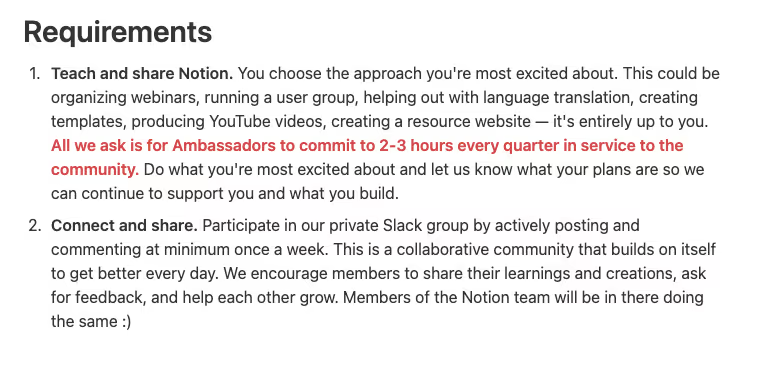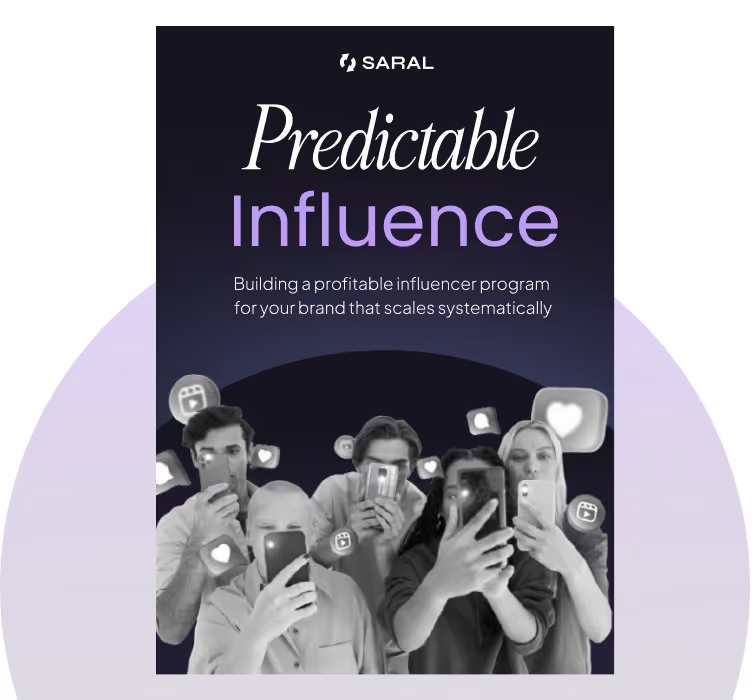Ready to drive incremental growth with influencers?
If ditching the randomness of influencer campaigns and building a predictable, ROI-first influencer program sounds like a plan. Consider talking to our team!

Forensics
Learn how Notion's ambassador program turned its users into promoters, boosting its growth strategy.
Contents
Imagine people on social media putting ‘<your brand name> Ambassador’ in their bio.
Do you feel that your brand has all the ingredients to convert buyers into raving fans who can't stop talking about your products with their colleagues, friends, or audience?
These may seem like aspirational goals or vanity metrics, but they do help your business grow — in terms of customers, revenue, and the impact they create. In this post, we'll explore how tapping into a raving fan base and converting them into brand ambassadors helped Notion become the world’s most loved note-taking app.

If you are a marketer or founder of a consumer SaaS or ecommerce company, you can take lessons from this strategy to grow your buyers/users, create a loyal following, and get regular feedback from your community without having to constantly spend on ads or running after your users for feedback.
A brand ambassador is a person who actively promotes the products & services of a brand without any monetary exchange for the promotion. They are usually the experts when it comes to talking about the brand or its products.
In the past, brand ambassadors used to be celebrities who would get paid for their efforts, but that changed when brands recognized that their actual super-users or fans are much more effective in spreading awareness and increasing brand loyalty.
The marketing effort done to identify the people who love your products & engage with them in long-term partnerships is called an ambassador program.
Notion's ambassador program is one of the most successful ones we've come across, so we'll break it down for you in this post. Learning from the best is insanely helpful. Ready? Buckle up 👇
A brand ambassador is different from a fan or brand advocate. Brand ambassadors are formally recognized by the brand and enjoy special perks from the brand to raise brand awareness.
Influencers are chosen based on the number of followers and engagement they have so the brand can reach a wider audience, and they are paid accordingly. Ambassadors are chosen based on their interest in the product & are motivated by a mutually beneficial partnership.
Influencer marketing is sometimes done to get quick, short-term results (brand awareness, promoting a new launch), while brand ambassador programs are run for long-term impact on the brand (brand loyalty, community). The duration of engagement with a brand ambassador is longer (think years) while it's shorter or just one time with an influencer.
“In the early days, we saw people on Twitter and Reddit sharing tips and providing support to other users. With a small marketing team, it was clear that this would be a way for us to amplify Notion.”
~ Camille Ricketts, Head of Brand and Communications at Notion (source)
Notion ambassadors are people passionate about Notion, teach how to use it effectively, run events in different cities and even collaborate with the Notion team to provide valuable feedback.
They lead local communities, organize online and offline events, produce courses and tutorials, create templates, share translations, and much more.
The subreddit r/Notion has 210K members (as of July 2022). That's a 4.5X growth in just 2 years as it was at 46K members in 2020. That's the equivalent of adding more than 220 new members to the group every single day! That means every day, 220 people are either getting to know about Notion or becoming power-users of the product.

Notion templates, dashboards, planners, layouts, courses, etc. that are being created by ambassadors and notion users drive brand growth as users are likely to upgrade or stick to the product when they realize its true power.

One Notion power-user and popular ambassador is Marie Poulin, who runs a YouTube channel around Notion. It has 33K subscribers and 1.8M total views.
When she shares the value she is getting out of Notion, it encourages others to try the tool & helps existing users get the most value out of it, which encourages upgrades & expansion, thus reducing churn. Ambassadors and champions like her have enabled Notion to tackle product onboarding at scale & compliments the customer success team.

Since ambassadors are passionate & expert-level users of the product, the Notion team leverages some of the ambassadors to help with training and onboarding new Notion employees.
Notion's ambassador story unfolds beautifully as the team kept their eyes & ears open for any signals that can help them grow and acted quickly on the insights they got.
It started when Camille Ricketts, the first member of the marketing team at Notion, noticed a bunch of tweets about how people are falling in love with the product. Notion fans on Twitter were resonating with such tweets and connecting with each other. Camille decided to bring in a new hire to run the community.
At the same time, Ben Lang launched Notion templates on Product Hunt (at that time, Notion didn't have their own template gallery) which got good traction as the #1 Product of the day and #2 product of the week.

He even started a Facebook group called 'Notion Made Simple.' His Notion fan site notionpages.com was being visited by 80,000 people every month. Ben knew everyone in the Notion community.
He got scouted by Camille, and together they started finding other such fans who would be ideal participants of the Notion community. Ben reached out to 10 people who loved the product and onboarded them on a single slack channel to discuss ideas.
In the first week of introducing the ambassador program (formerly called 'Notion Pro'), it received 600+ applications. They arrange events and AMAs with these ambassadors, where Ivan and Simon participated as well.

Today they have about 200+ ambassadors across 23 countries. Imagine what something like this would mean for your brand!
Notion was clear about who can be their ambassador and what they are required to do. They made their requirements clear in plain, simple language.


Many brands are protective about their brand assets (color scheme, logos, typography, etc.) & prohibit any usage. But Notion allows its community to create products on top of Notion, use the logo on a t-shirt, in a template, etc. There are brand usage guidelines in place, but those don't stifle creation by the community.
Notion figured out where their ideal customers are hanging out and where they are vocal about using Notion. They reached out to them proactively rather than letting things take their course.
Notion ambassadors get all kinds of perks that are not strictly just monetary benefits. Notion sends its ambassadors swag that they can distribute at events or in giveaways.

Any effort that costs recourses, time, and effort has to be linked to a business outcome. Notion has signups and social media followers as their KPIs. It has 271,000+ followers on Twitter, 188,000+ on Instagram, 173,000+ followers on LinkedIn, and Youtube with 165,000+ subscribers. A mix of conversions, brand exposure, and market penetration are yardsticks to measure the success of the ambassador program.
Notion ambassadors can create micro-communities, & forums around Notion. They can host meetups, or online events. The company supports these efforts but doesn't micro-manage them.

If you are curious about why this headline is so specific, then let us show you a slide that Olivia - CRO at Notion - once shared at a conference.

That was it! Did you like our report on Notion’s ambassador program? My hope is that you took away something useful and actionable from this. Bookmark the post and come back to it for inspiration later.
One of the best ways to be successful is to study successful brands and emulate what worked for them in their journey. Notion is one such example.
SARAL makes it easy to replicate Notion's success with our all-in-one influencer marketing platform. From finding the perfect ambassadors to tracking ROI, we've got you covered.
.avif)
✓ Global influencer discovery
✓ Automated outreach campaigns
✓ Product shipping management
✓ Sales and ROI tracking
Book a consultative call with SARAL experts to see how you can build a thriving ambassador program in weeks, not months.

Sign up for a 7-day email course on the unique "Predictable Influence" strategy used by top brands like Grüns, Obvi, Tabs Chocolate.

Jump into our email course and master the basics of building an influencer marketing program. It’s everything you need to start strong.

If ditching the randomness of influencer campaigns and building a predictable, ROI-first influencer program sounds like a plan. Consider talking to our team!